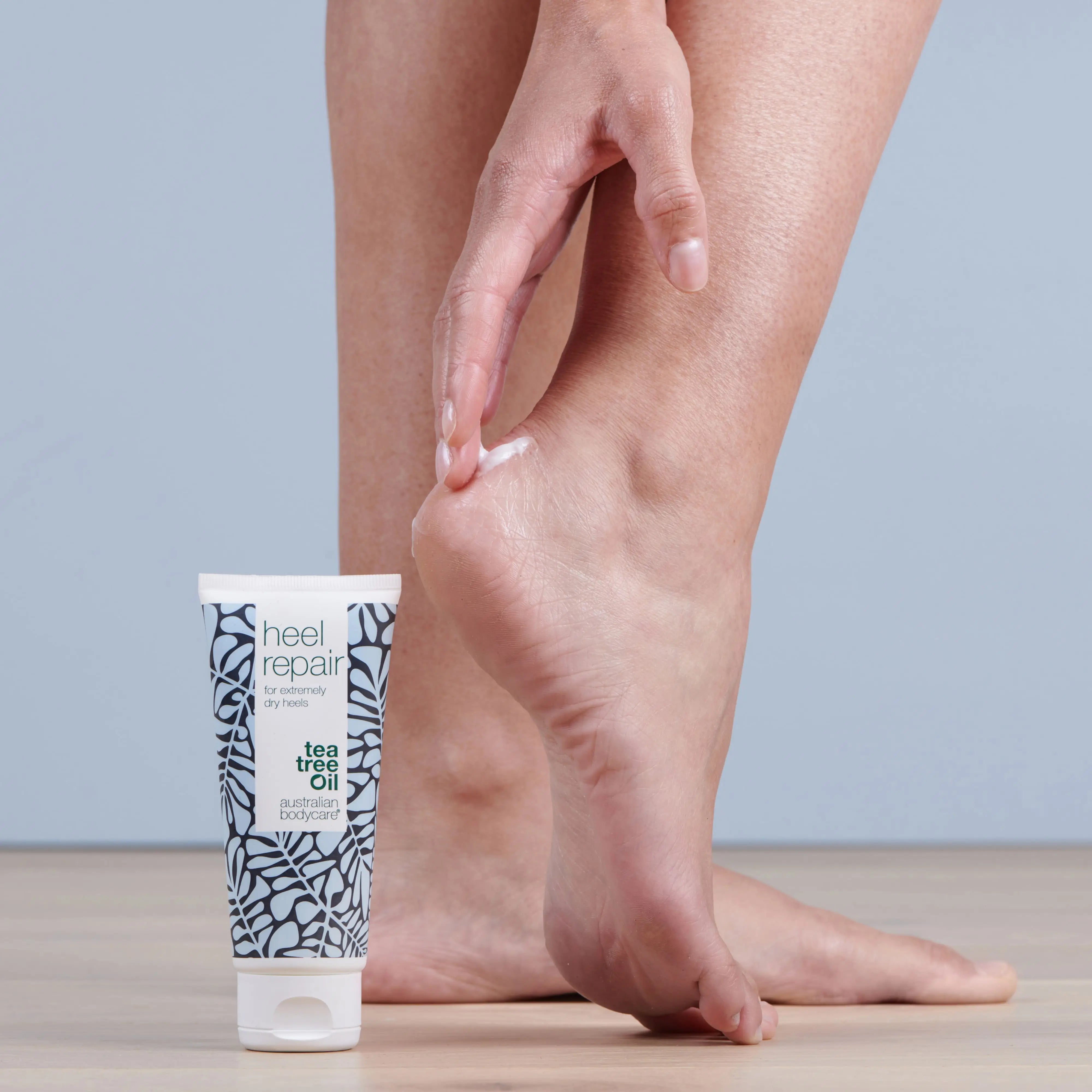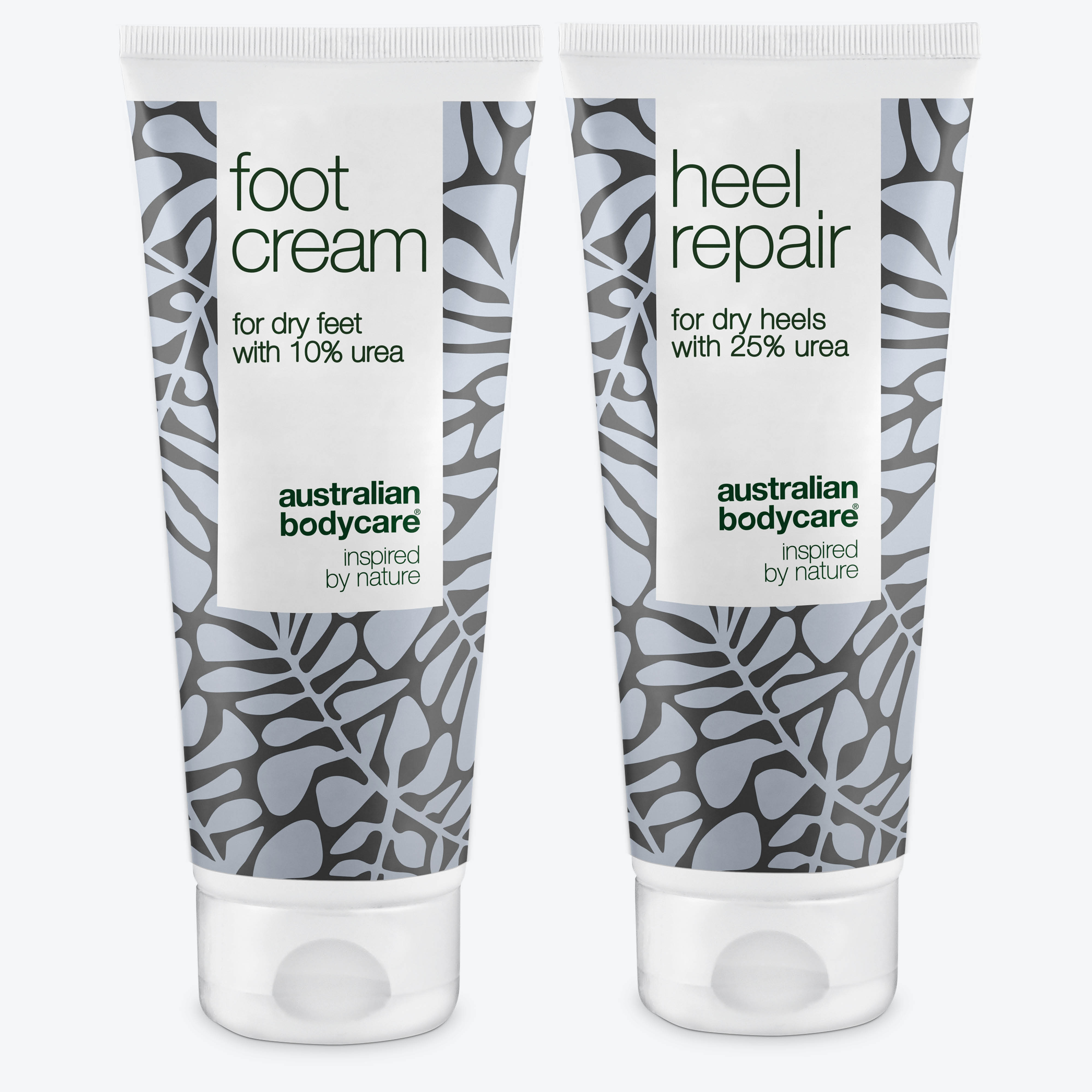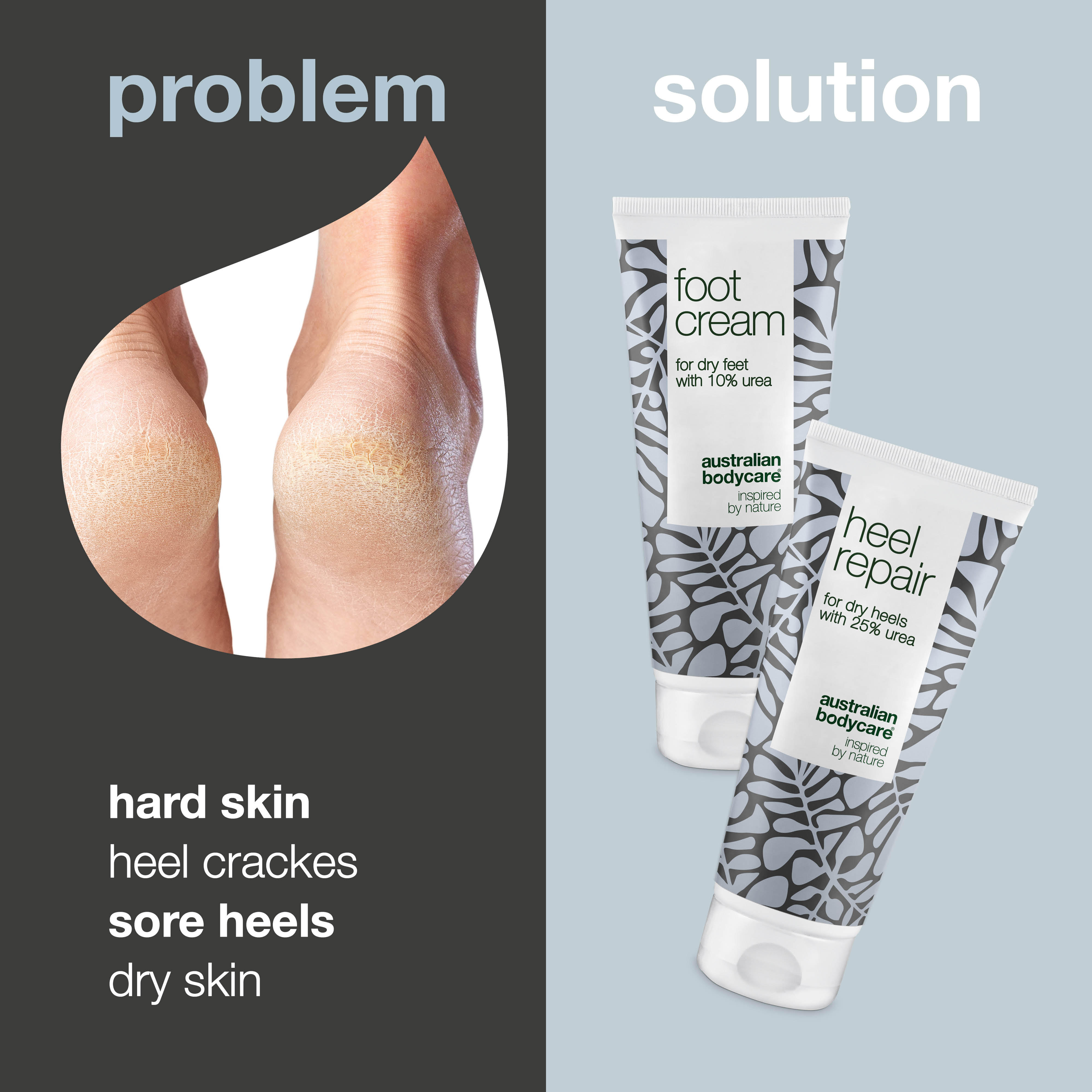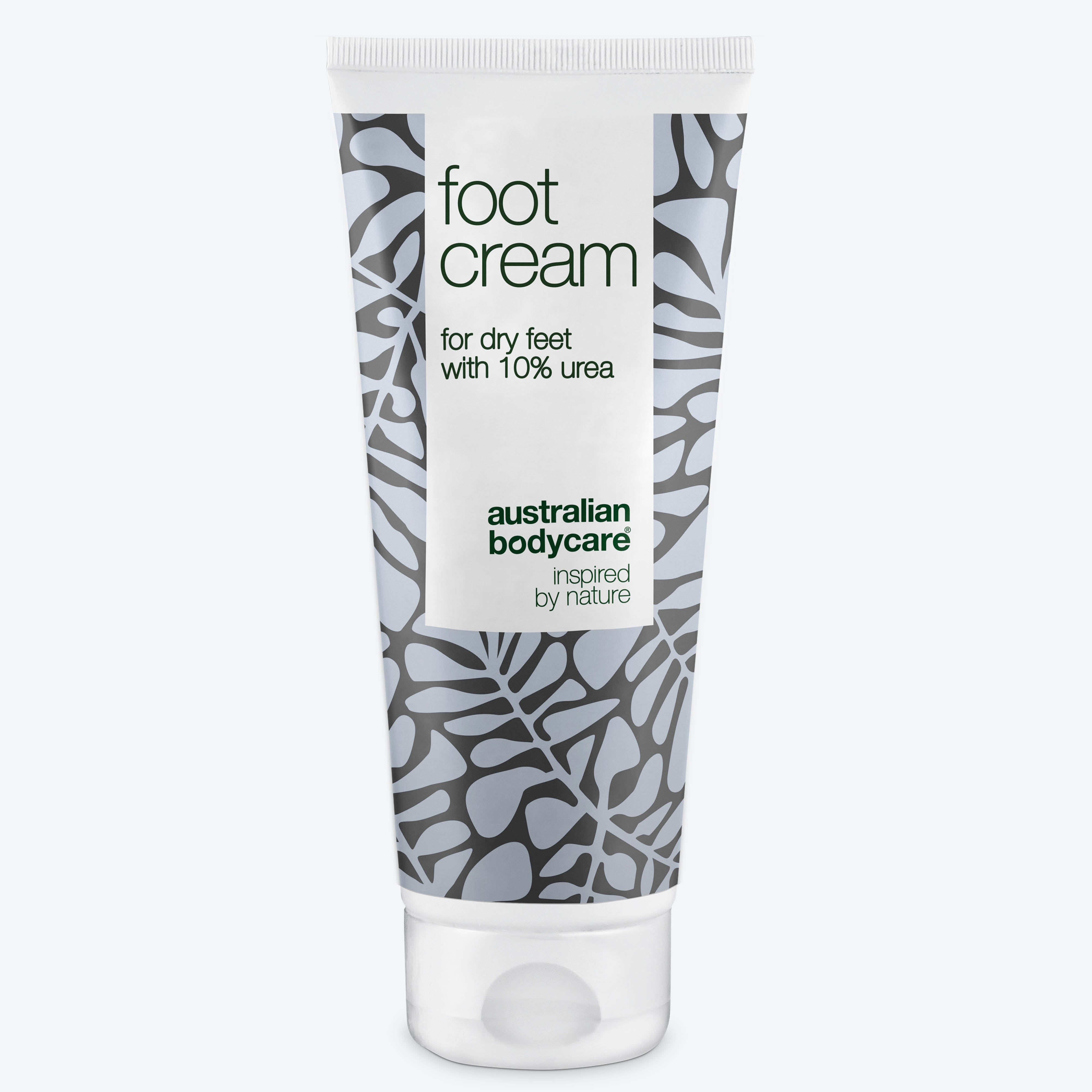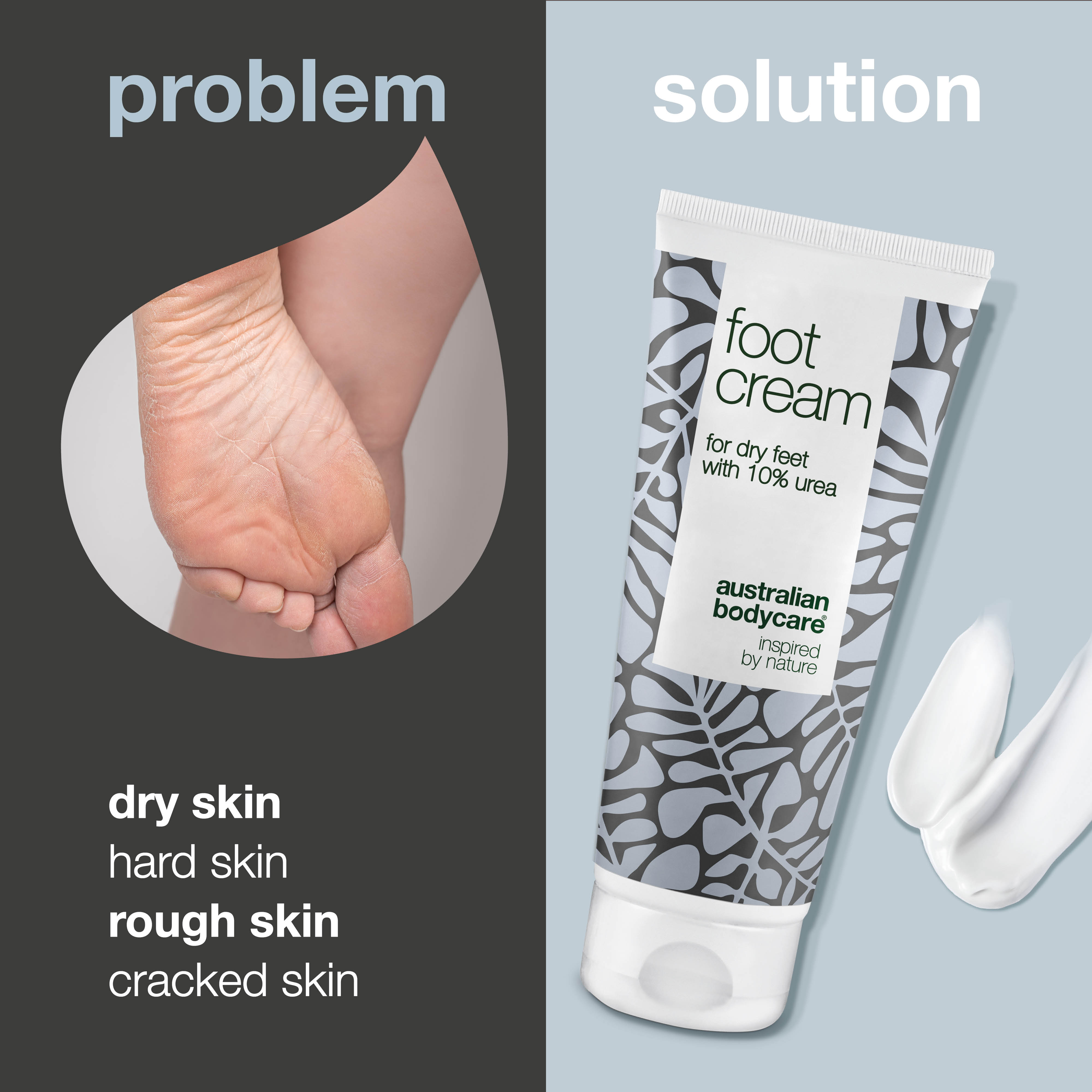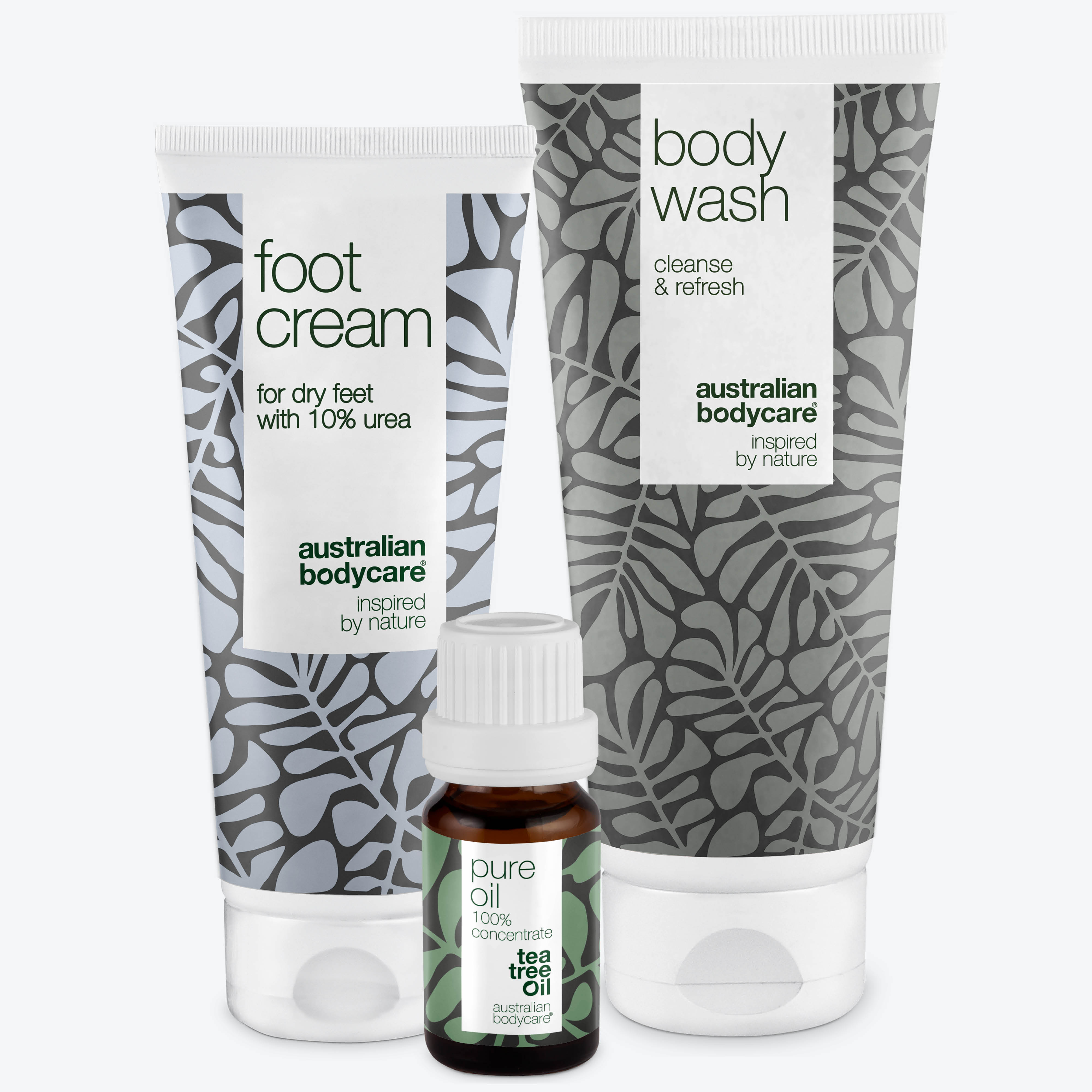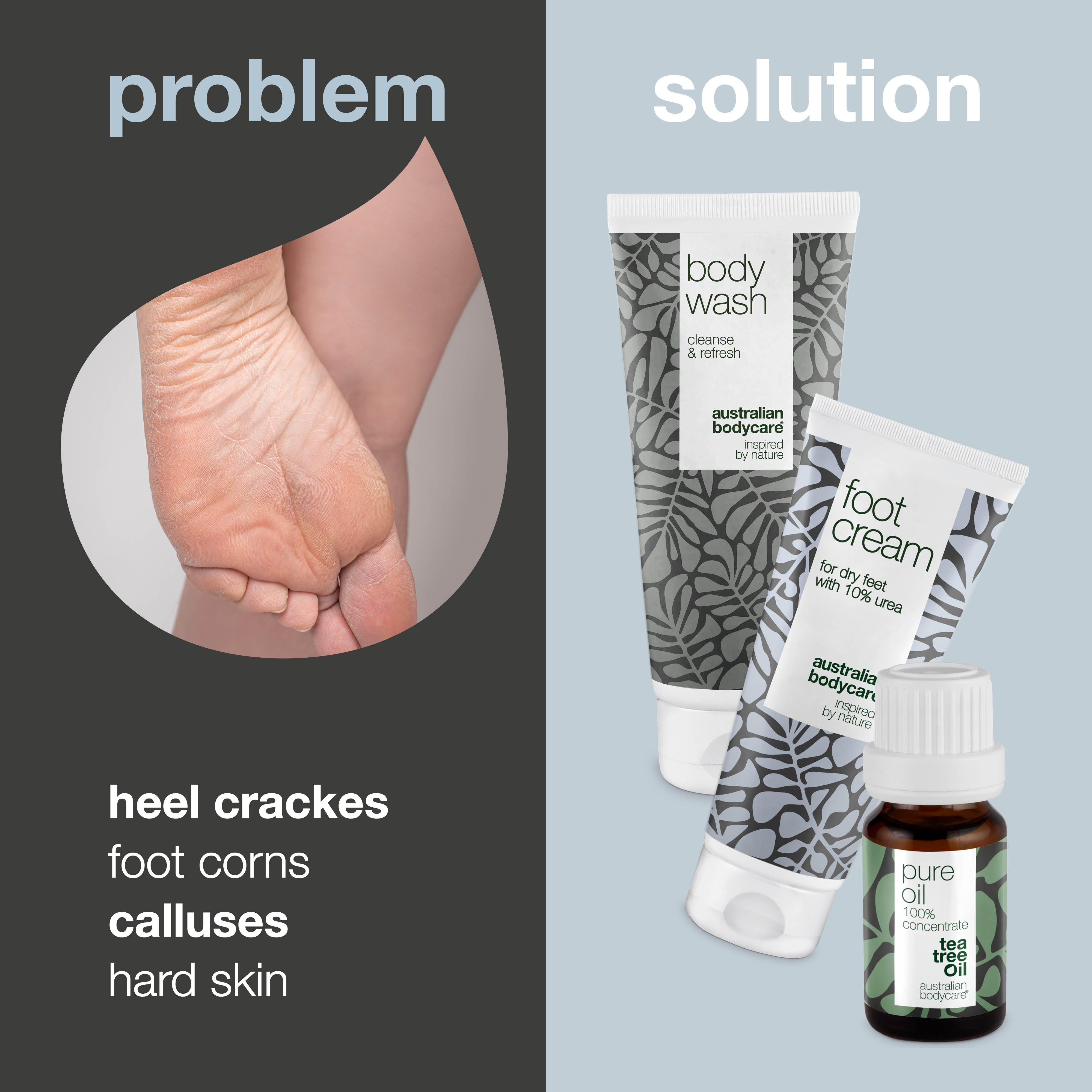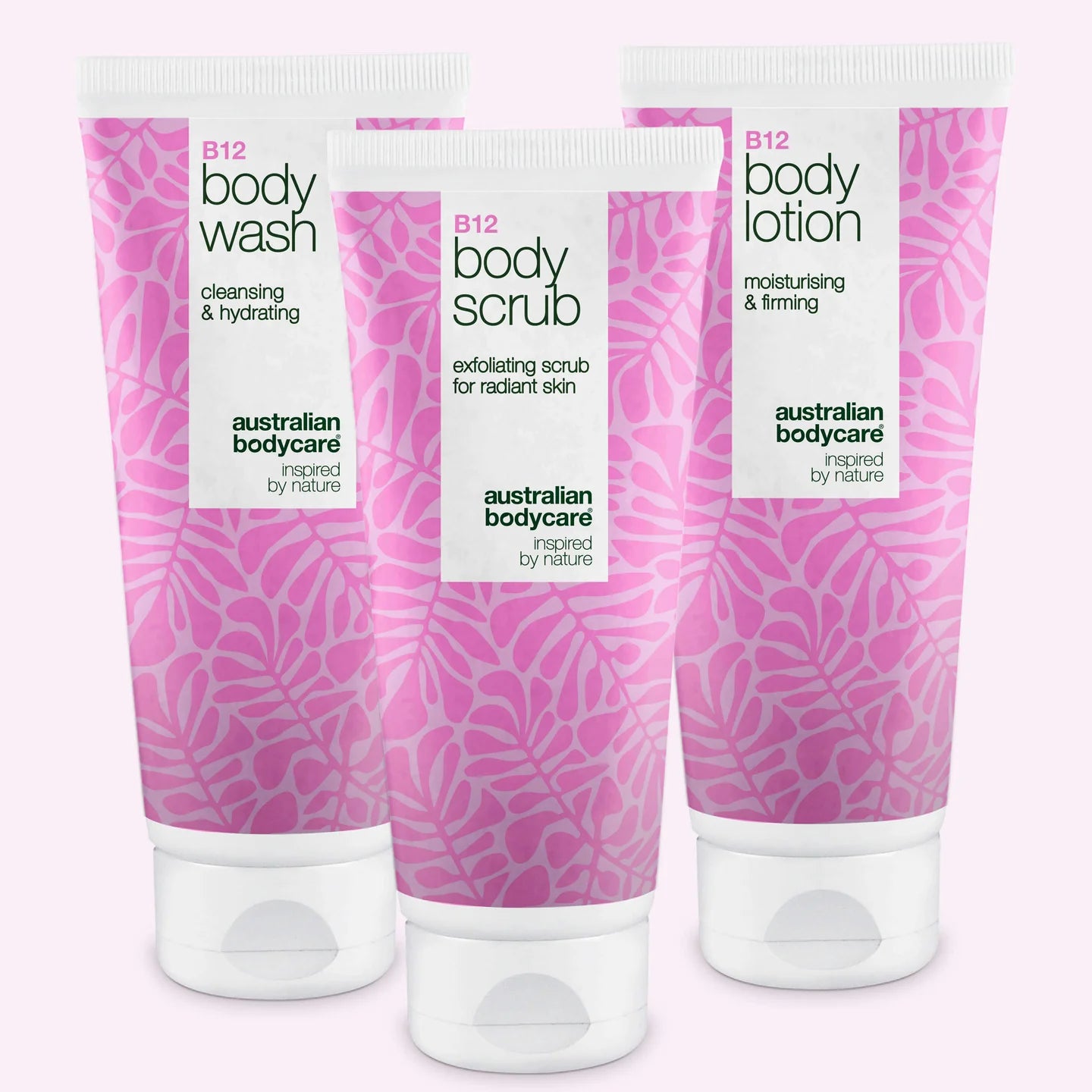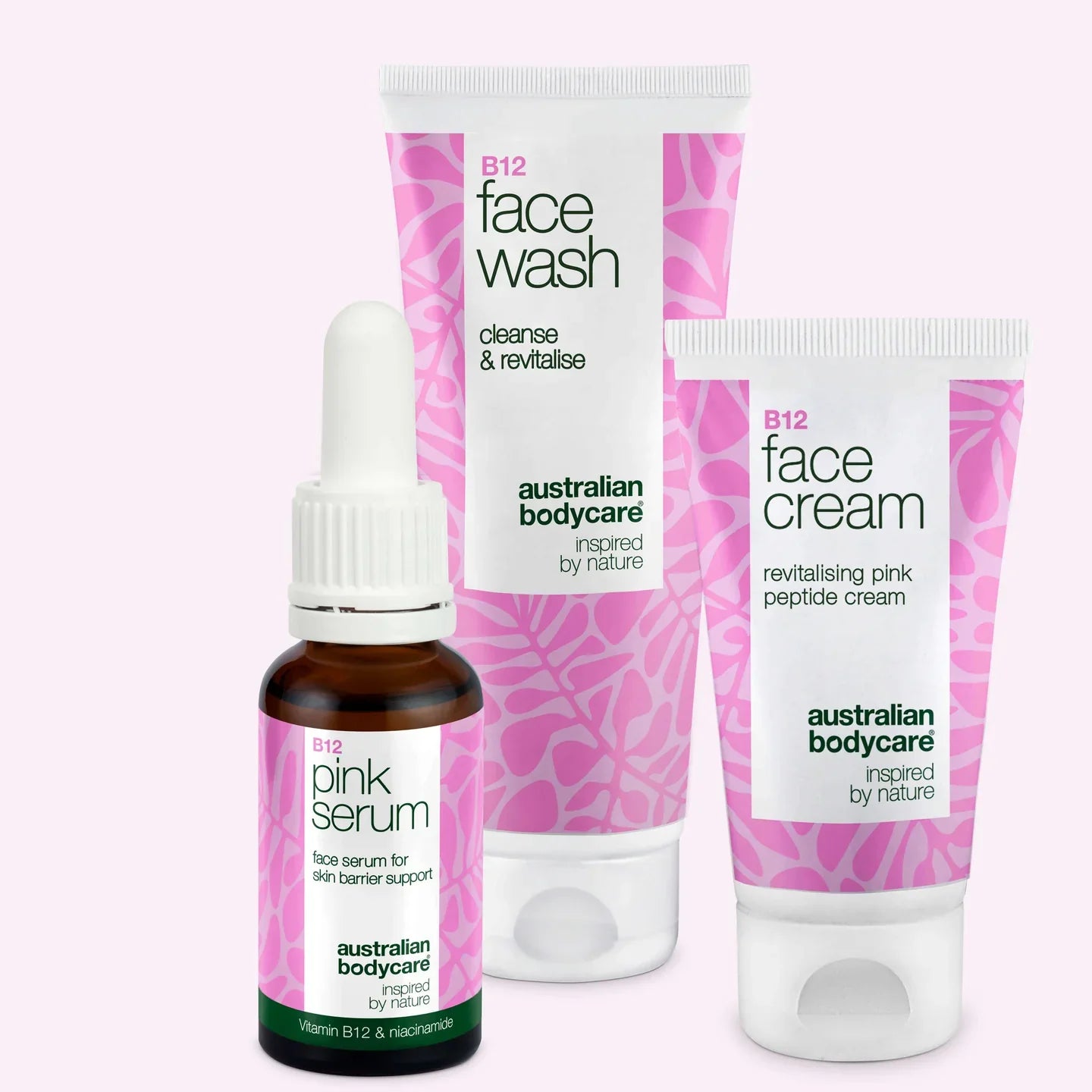Say goodbye to cracked heels and dry heels
Cracked heels and dry heels are a problem that many people struggle with. This applies to both women and men. Not only can it be unappealing to look at, but it can also be deeply bothersome. Fortunately, there are some good ways to solve the problem. Become knowledgeable about cracked heels and how best to treat them.
Table of contents
What are dry, cracked heels?
Cracked heels and dry heels are openings in the hard skin on the heel of your foot. The openings appear as cracks and are often located on the underside of the heel. The cracked heels have hard edges, and the cracks can extend deep into the skin and cause bleeding.
The skin is our body’s largest organ. It is also a great sensory organ because you feel touch, pressure and pain on your skin. With its three layers, the skin is a complex organ that consists of the epidermis, dermis and subcutaneous tissue. It is within these layers that cracked heels and dry heels can cause problems.
Dry heels often become cracked heels, which are fractures of the epidermis skin layer of the heel. Often the cracks only reach to the epidermis, where it is purely a cosmetic problem. However, if the cracks go all the way into the dermis, the cracks will cause bleeding and pain that will worsen as you step on your heel.
Cracked heels do not go away on their own but require treatment to resolve the problem. If the cracks break down further into the skin and cause the skin to bleed, there is a risk of infection and other complications. Therefore, it is important to treat the cracked heels.
Why do you get cracked heels and dry heels?
Cracked heels are often due to the heels being overloaded from walking too much or bumped about. Your heels will be more easily bumped and strained when wearing shoes without heels. Sandals and heel-less shoes have nothing to protect your heels from getting hit on the floor and forming dry, hard skin.
Your heels are strained from your body weight too when you stand and walk. This movement and weight stretch the skin around your heels.
At the same time, if you do not properly care for your feet, the skin often becomes very dry – this is often why the cracked heels develop. The skin’s natural moisture level becomes unbalanced, making the skin on your heels vulnerable and fragile. Dehydrated skin is not nearly as strong as hydrated skin. When the natural moisture balance is broken, your heels will form a thick layer of hard skin. It is a defence mechanism, but the hard skin also hinders the healing process.
Overview of what causes cracked heels:
- Straining the skin on your heels. If you stand up for an extended period of time, your heels will be severely stressed. The same is true if you are overweight. If you weigh too much, your fat deposits underneath the heels will be loaded more than they can bear. This makes it impossible for the skin to be flexible due to the heavy weight, and then cracked heels can develop.
- Decreased moisture levels. If the skin under your foot is dry and therefore hard, it will be more vulnerable to damage. Moisturised skin is more resistant, so if the skin on your heels is dehydrated, it will be less elastic, making the skin more easily cracked.
- Frequent washing. Water dries out the skin so that the natural oil and moisture balance is disturbed. Therefore, if you often expose your feet to water, for example if you spend long periods in humid environments, your heels will often become dry and risk cracking.
- Wrong footwear. Wearing improper footwear that is too small and pinches around the heels can result in strain on the skin – and thus cracking occurs. If you often wear open shoes, the skin around the heels will also be more exposed to the elements and at risk of cracked heels.
- Genetic cracked heels. Genetics can also be a reason why you get cracks in your heels. If you are naturally equipped with dry, thick skin on your heels, you will be more vulnerable to forming cracked heels.
Who gets cracked heels?
Cracked heels and dry heels can affect people of all ages. This applies to both men and women.
People with a tendency to get dry skin on their heels will be more likely to be affected by cracks on the heels. This often applies to people who are genetically predisposed to dry skin. Also, older people tend to form dry and scaly skin. The skin loses its elasticity as the years go by, and therefore heel cracks are a problem for many elderly people.
For example, if you have a job where you stand and walk a lot – it could be as a hairdresser, shop assistant or another profession that requires you to not sit down much during the day – the skin extends a lot around your heels, so it becomes overloaded and fragile. Therefore, people with non-sitting work are also more prone to getting those annoying cracked heels.
Symptoms of cracked heels
There are some clear symptoms that you have cracked heels. Cracked heels will initially feel very tight as the skin becomes less flexible. It is one of the first signs that you are developing cracked heels. It will often be accompanied by dry skin, itching and don’t forget the hard skin. There may also be soreness and pain in the heel as the skin becomes more strained and less flexible.
The skin is tougher, but often it can also have a yellowish colour, and the dry, cracked heels may eventually start to peel. Maybe the cracks are not unpleasant at first, just a little annoying. However, if left untreated, the skin may crack even deeper, causing the cracked heels to bleed – creating a risk of infection with bacteria permeating the skin layers.
Short overview of the symptoms of dry cracked heels:
- The skin is tight and less flexible.
- Heels itch.
- The skin on the heels is dry and hard.
- Soreness and pain – especially when the heel is touched or strained.
- Your heels are bleeding.
How to treat cracked heels
In order for your cracked heels not to deteriorate and make it painful to go even for short walks, it is important that you treat your cracked heels with cream. With treatment, you can effectively restore cracked heels and dry heels, giving you healthy and flexible heels without cracks and any pain.
Cream for cracked heels is the right treatment
If you need to treat dry and cracked heels, the way forward is not with foot bath and a file. On the contrary, the foot bath dries feet and heels further. Instead, treat your skin with a heel cream. For example, try Heel Repair from Australian Bodycare, a cream specially developed for treating dry heels with hard skin and cracks.
The cream contains lots of active ingredients like Urea and Tea Tree Oil that effectively protect your cracked heels from bacterial attacks. At the same time, the cream provides plenty of moisture and care for the cracked and vulnerable skin, allowing it to restore its natural moisture level.
Supplement the care with Australian Bodycare’s Foot Cream. Its content of Shea butter, Urea and Tea Tree Oil gives your heels the best daily care. Used together or individually, they help soothe cracks and dry skin while counteracting the formation of new cracked heels.
The best treatment is simply cream and a great deal of patience. The skin on your heels does not restore its natural balance overnight, it requires prolonged care and treatment with a nourishing heel cream.
The result after 2 weeks of using Heel Repair & Foot Cream
Talk to your doctor
If the symptoms and cracked heels are not repaired after intensive moisturising, it is important that you consult your doctor. He or she can rule out other more serious health-damaging causes that could be causing the cracks in your heels. Together you can talk about a further course of treatment.
Preventing dry cracked heels – how do you do it?
Like everything else, prevention is the best treatment. It is far easier to care for your feet than to repair injuries. Therefore, it is also important that you give your feet the proper care on a daily basis if you want to do your best to avoid cracked heels and sore, dry heels.
Moisture outside and inside
It is a good idea to moisturise your body from the inside out so that the skin does not dehydrate and lose moisture. You can do this by drinking lots of water and moisturising your feet and heels daily with a moisturising foot cream. Make it a habit to moisturise your feet with a heel cream both morning and evening so that they are moisturised throughout the day and night.
Choose the right footwear
In addition, you can prevent cracked heels by carefully choosing your footwear. Avoid shoes that are too loose or too tight on your foot. The footwear should fit your feet – without pinching or feeling too big. You can also help your feet by minimising the use of open shoes and sandals as much as possible. With closed shoes, you better retain the moisture in your skin that is not as exposed.

